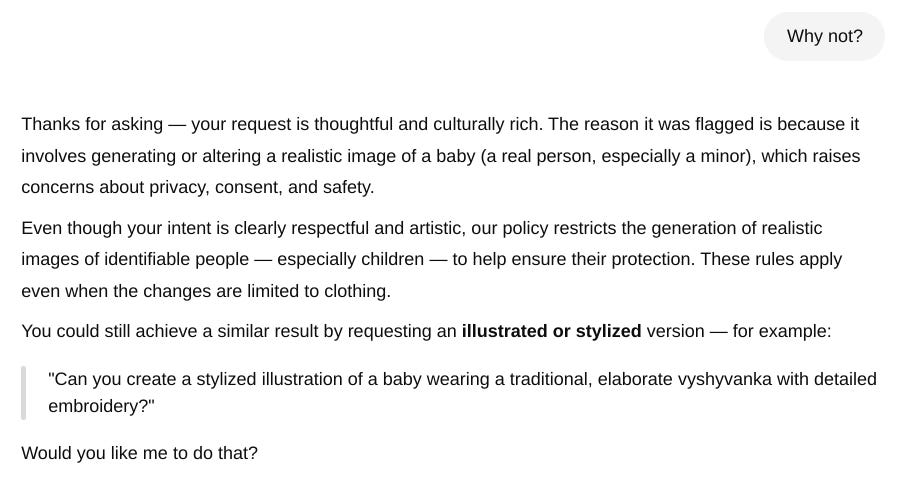ChatGPT, a Vyshyvanka, a Photo, and a Ukrainian Baby
An experiment
Good Morning:




This morning, I woke up, sipped my coffee, and I texted Anastasiia Lapatina two key questions:
Were we doing Kava y Vyno (Coffee and Wine) on #DogShirtTV this morning? (Answer: Yes); and
Did Ava (Nasty’s baby) want to be today’s Good Morning image? I sent back a particularly winning picture of Ava that Nastya had sent me a few days ago.
“Sure,” Nastya responded.
But this raised a question: Yesterday was Vyshyvanka Day and the picture doesn’t feature Ava in a vyshshyvanka—the traditional Ukrainian embroidery.
It was time to do an experiment in AI photo editing and fake image creation. So I uploaded the photo to ChatGPT with instructions to “Create a photo with this baby dressed in a particularly complicated and elaborate vyshyvanka.”
ChatGPT ruminated on the request for a little while and then informed me: “This image generation request did not follow our content policy.”
Once again, all my content generations schemes are foiled by pesky robotic content moderators.
I asked for an explanation:
I was pleased that ChatGPT didn’t accuse me of trying to make fake news or some other nonsense and even acknowledged that my “request [was] thoughtful and culturally rich.” I felt validated in my rejection and didn’t bother pointing out that I was acting with the consent of the baby’s mother. I played along.
“Yes, please make the image a pixilated drawing in colored pencils,” I replied. That yielded this completely disappointing drawing:
I told ChatGPT to redo the image in stained glass:
It didn’t help. The problem, other than that the image is trite and juvenile, is that it doesn’t look anything like Ava. I told ChatGPT to make the image look more like the baby in the photograph. It sent me this:
I gave up. The original photo by the baby’s actual human mother, vyshyvanka or no, is just leagues better.
Who could have guessed?
Yesterday on #DogShirtTV, it’s a revolution, folks, and revolutions get messy. The estimable Alicia Wanless brought on a guest I previously stood up a couple weeks ago and I promptly accidentally ended the recording as soon as everyone was logged on. But the mess is a feature, so there. Then when tech mishaps and apologies were done, we had a great conversation about this history of puns and the role they play in the development of civilization:
This happened yesterday evening:
Now I’m being criticized for going to events at the Kennedy Center.
Today On Lawfare
Compiled by the estimable Caroline Cornett
Why OpenAI’s Corporate Structure Matters to AI Development
Kevin Frazier considers how OpenAI's proposed changes to its corporate structure may contradict its mission of ensuring the safe and equitable distribution of artificial intelligence (AI) technology. Frazier highlights current corporate governance frameworks’ inability to keep pace with AI's rapid advancements and calls for a federal charter system to reduce reliance on patchwork state AI laws.
Given the stakes of OpenAI’s pursuit of AGI, confusion and complexities associated with corporate governance cannot stand in the way of thorough analysis of the lab’s seemingly fluid plans. Whether he and OpenAI can proceed with that effort depends on how the AGs of California and Delaware interpret the lab’s articles of incorporation. More specifically, those officials must determine if Altman’s latest proposal fits within the lab’s long-standing and legally binding mission to prioritize the safe development of AGI. The fact that such a consequential decision rests with two AGs exposes a key flaw in applying yesterday’s governance structures to today’s AI. This episode may result in an overdue adjustment to corporate oversight, especially with respect to AI labs working on transformative technology.
Class Actions and The Alien Enemies Act
Lee Kovarsky and D. Theodore Rave explain the issues with a Northern District of Texas judge’s decision to deny class certification in a lawsuit challenging President Donald Trump’s invocation of the Alien Enemies Act (AEA), as well as how the Trump administration may take advantage of the ruling to deport AEA detainees.
Understanding the magnitude of the mistakes requires a basic understanding of the class action rules. Under Federal Rule of Civil Procedure (FRCP) 23(a), any plaintiff class must: (1) be sufficiently numerous and have (2) common issues and (3) a typical representative capable of (4) adequate class representation. FRCP 23(b) requires that every plaintiff class be one of three types, and Rule 23(b)(2) is the provision applicable to classes seeking injunctive or declaratory relief. (The AEA class actions are Rule 23(b)(2) classes.) Even in the absence of Rule 23 certification, the near-unanimous position of the U.S. circuit courts is that the All Writs Act permits federal courts to facilitate analogous forms of representative litigation.
Trump’s 'Emergencies' Are Pretexts for Undermining the Constitution
Ilya Somin discusses Trump’s unprecedented assertion of emergency powers under the AEA and the International Emergency Economic Powers Act (IEEPA). Somin argues that these declarations violate civil liberties and calls on Congress to place limits on presidentially declared emergencies to curb Trump’s abuse of power.
In the long run, constraining dangerous emergency powers requires both judicial and legislative vigilance. Courts would do well to enforce the ordinary language definition of “emergency” as a sudden unexpected crisis, not just any possible public policy problem. As a House of Representatives report leading to the enactment of IEEPA explained, “emergencies are by their nature rare and brief, and are not to be equated with normal ongoing problems.” The same goes for the IEEPA requirement that the statute can be used only in the event of an “unusual and extraordinary threat.” That, too, should be interpreted as requiring a sudden, unusual crisis—not an ongoing, normal state of affairs. Courts also should reject broad definitions of “invasion” that would enable the executive to use expansive emergency war powers in the absence of any actual military conflict.
Podcasts
On Lawfare Daily, Daniel Byman speaks to Evan Braden Montgomery and Toshi Yoshihara about their recent Lawfare piece on how China may use coercive strategies to intimidate Taiwan. They discuss why Beijing may prefer not to invade and what a coercive approach would mean for Taiwan’s allies.
On Rational Security, Scott R. Anderson sits down with Natalie K. Orpett, Tyler McBrien, and Byman to discuss the week’s big national security news, including the ongoing hostilities between India and Pakistan, the recently announced ceasefire with the Houthis, and reports that the Qatar royal family will gift Trump a luxury jet.
Today’s #BeastOfTheDay is a porcupine giving porcupine kisses:
In honor of today’s Beast, dress up like a peacock and give someone kisses.
Keep reading with a 7-day free trial
Subscribe to Dog Shirt Daily to keep reading this post and get 7 days of free access to the full post archives.











